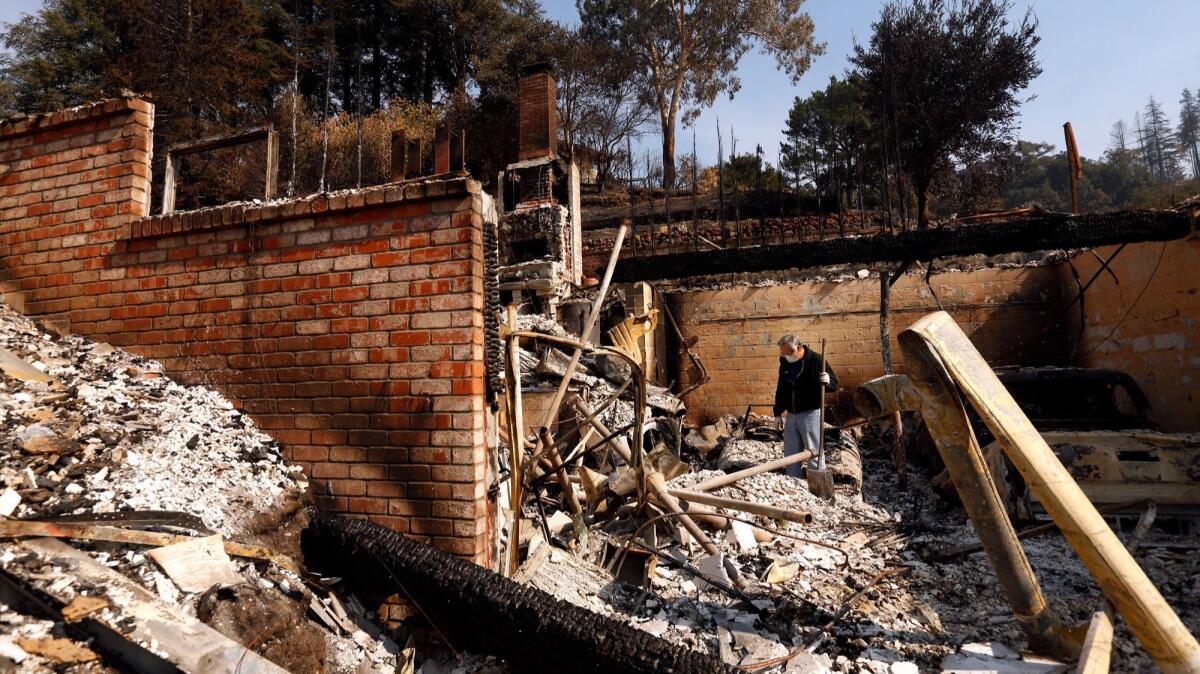Q&A: How will the Northern California wildfires affect the property taxes of those who lost their home?

- Share via
Napa County assessor John Tuteur has listened to people in disaster relief centers share stories of how they lost their homes and all their possessions when recent wildfires ripped across Northern California.
Then Tuteur tells them the state offers substantial property tax relief and protections as they consider what’s next.
“People say, ‘That’s the first good news I’ve had since my house burnt down,’” he said.
Proposition 13, the landmark 1978 ballot measure, has kept homeowners’ property tax bills lower than they would be otherwise by basing tax rates on when people bought their houses, rather than their current market value.
Under Proposition 13, tearing down your old house and building a new one would normally result in a full reassessment of your property and therefore a higher tax bill.
But after disasters that’s not the case: California law offers homeowners numerous ways to lower their taxes in the short term and maintain their previous rates if they decide to rebuild or move to a new home.
Here’s how it works:
How does Proposition 13 affect my property taxes in general?
Proposition 13 passed nearly four decades ago amid concerns that rising property taxes could force people out of their homes. The ballot measure limited property taxes to 1% of a home’s value at time of purchase and said the assessed value on which the taxes are based could only increase by a maximum of 2% a year — no matter how much a home’s market value goes up
So, if in 2000 you bought a home in San Francisco for $500,000, your property taxes would be based on that value, factoring in the corresponding maximum 2% annual increases, even if that home is worth $1 million today.
My home just burned down. What options do I have?
Many.
The state allows homeowners to defer paying their property taxes in the wake of disasters and also temporarily lowers their taxes if a house has received more than $10,000 in damage or is gone entirely.
If homeowners defer their taxes and receive disaster relief, they will owe less money when the bill ultimately comes due.
In this case, homeowners affected by the fires are supposed to contact their county assessor’s office by Dec. 10 to receive a property tax deferral. But in Sonoma County, where more than 5,300 structures were destroyed, including 5% of the homes in the city of Santa Rosa, the assessor’s office is providing deferrals and disaster relief to homeowners automatically.
“We wanted to make it as seamless and easy as possible for people to be able to get relief,” Sonoma County Assessor Bill Rousseau said.
I want to rebuild my house or buy somewhere else in California. What will happen to my taxes?
State law offers numerous property tax protections when it comes time to rebuild, too. In short, if your house burns down after a disaster, you get to keep your Proposition 13 benefits.
A rebuilt house that’s substantially the same as the one previously on the property will maintain all Proposition 13 protections. So if you bought your house in Sonoma County in 2005, it was destroyed in the fires and you decide to rebuild, you’ll pay the same property tax rate as you did before.
Homeowners who lost their properties also can buy a new home in the same county and take their Proposition 13 benefit with them. For the tax rate to transfer completely, the new home’s purchase price has to be up to 120% of the market value of your previous home at the time it was destroyed.
This benefit extends to other parts of California. Ten counties — Contra Costa, Los Angeles, Modoc, Orange, San Francisco, Santa Clara, Solano, Sonoma, Sutter and Ventura — allow homeowners displaced by natural disasters to keep their prior property tax rate. A homeowner who lost a house will be able to buy a new one in any of those counties and keep their tax rate.
What if I want to add another unit on my property or build or buy a bigger house?
The North Bay faced soaring housing prices before the wildfires wiped out thousands of homes. Some leaders in Santa Rosa, the largest city in the region, want to encourage residents to add smaller second units, known as granny flats, on their properties when they rebuild as one way to address the housing shortage.
Doing so wouldn’t require you to give up your Proposition 13 protections, either. You would keep your tax rate for your new home, and add the value of the second unit onto the property.
The same process holds if you wanted to build a larger house on your property or purchase a more expensive one instead. You’d keep your tax rate and the assessor would simply add the additional new value to determine the amount you’d pay.
FOR THE RECORD:
11:55 a.m.: An earlier version of this article described Proposition 13 as limiting the increase in a property’s tax bill to 2% a year. The proposition limits the increase in a property’s assessed value to 2% a year.
ALSO
Mapping the destruction from California’s wine country fires
Thousands displaced by Northern California's wildfires now face the region's housing shortage
With 5% of its housing destroyed by fire, Santa Rosa faces wrenching questions about its future
Get the L.A. Times Politics newsletter
Deeply reported insights into legislation, politics and policy from Sacramento, Washington and beyond. In your inbox three times per week.
You may occasionally receive promotional content from the Los Angeles Times.








